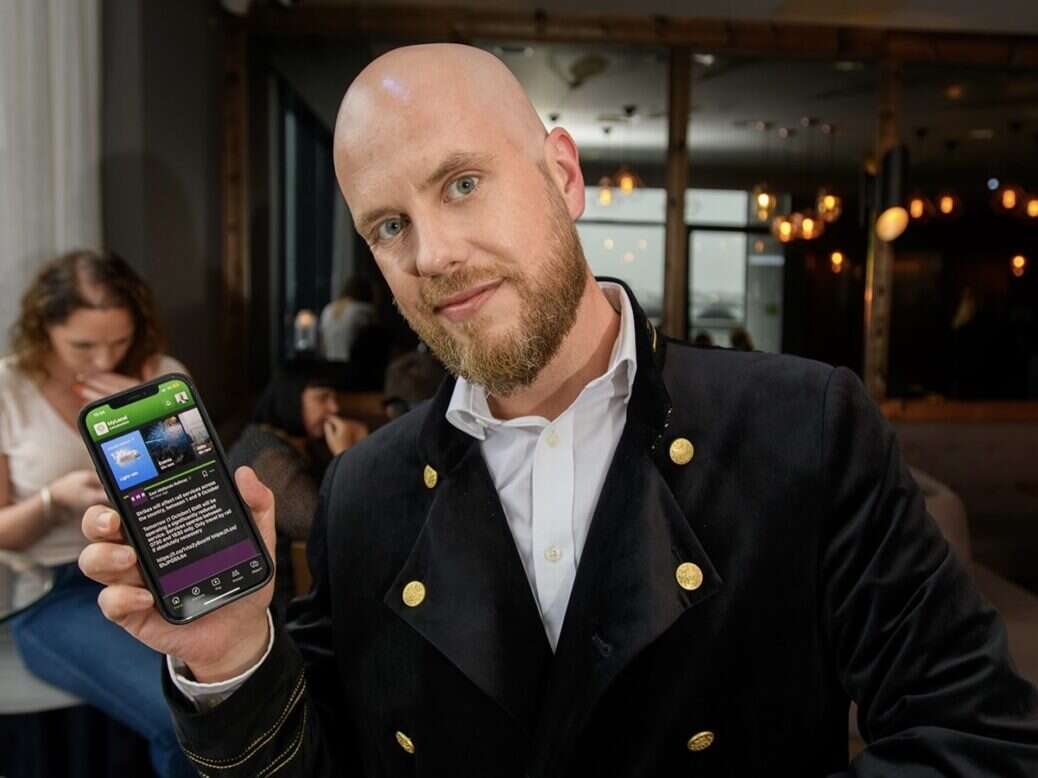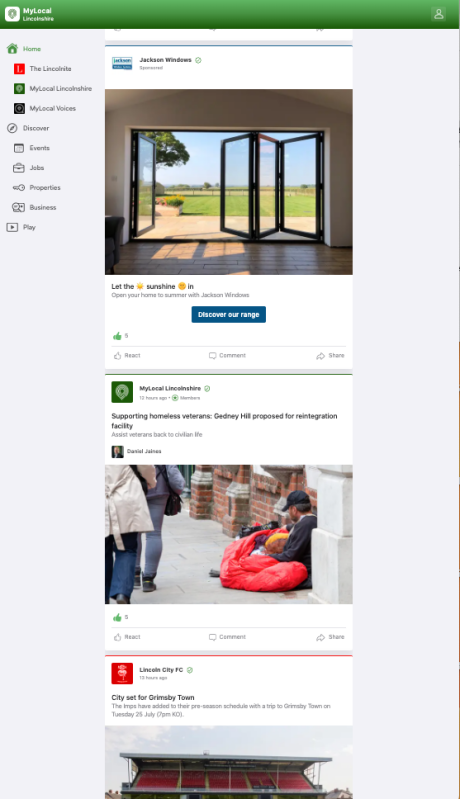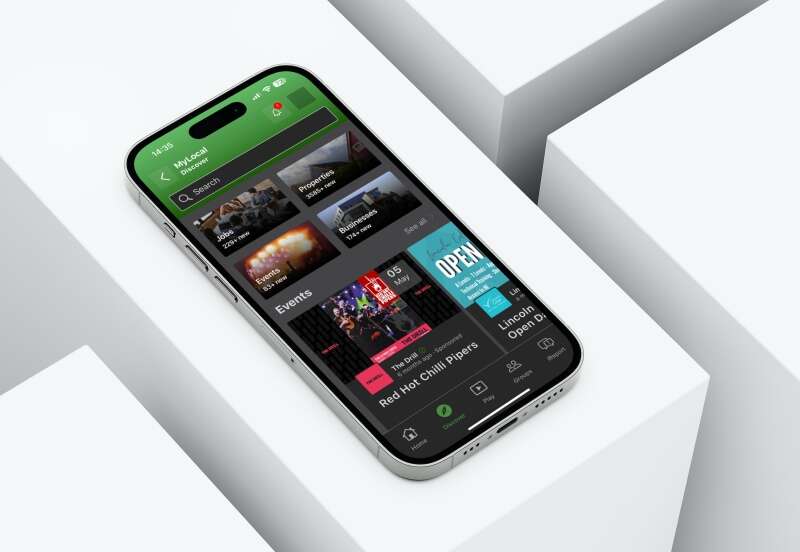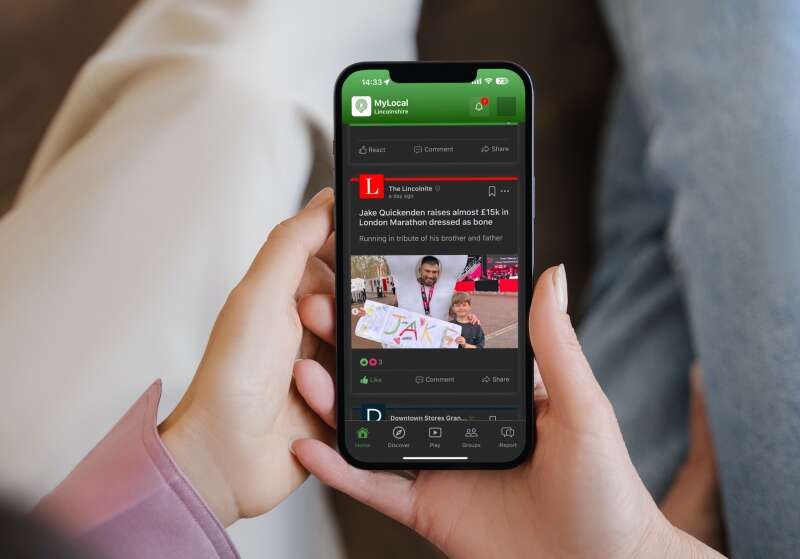
Independent local publisher The Lincolnite is in the process of ditching its website, doesn’t run programmatic ads, and allows the police and councils to publish press releases directly into its news output.
But The Lincolnite’s reporters, its managing editor says, are out on the beat every day creating original local journalism, most of which lives outside the paywall. And, tantalisingly for many publishers, it owns much of its audience: it has direct access to its readers, unmediated by the tech platforms.
The Lincolnite is currently migrating its readers away from its website and onto a new, purpose-built platform for news named My Local. And when it’s done, it wants other local news publishers to join it there.
Press Gazette spoke with The Lincolnite’s co-founder and managing editor Daniel Ionescu about why he hopes the My Local platform can solve some of the biggest commercial and editorial woes afflicting local news.
[Read more: UK local newspaper closures – Launches in digital and print balance out decline]
Why The Lincolnite built My Local
Ionescu co-founded The Lincolnite in 2010 with a peer from his journalism course at the University of Lincoln. They intended for the site to be “a little summer project” trading off the contacts they had made while working on the student newspaper – but digitally providing “today’s news today”, Ionescu said, made The Lincolnite more popular in the county than expected.
The title has grown steadily in the years since. In 2015 The Carnegie Trust claimed it was Lincoln’s “most popular source of online local news” in a report on successful local news outlets. In 2017 it won a local democracy reporter contract, and when the pandemic hit, The Lincolnite weathered the headwinds without having to lay off or furlough any staff.
Ionescu said the seed for My Local, which he co-founded with fellow University of Lincoln journalism grad Katrina Burrill and launched six months ago, came as they “looked at creating alternative sources of revenue and not becoming too overly reliant on traffic from social media”.
They also felt they had too few reporters to do everything The Lincolnite needed: “They had to do everything,” Ionescu said. “They had to rewrite police stuff, they had to do council stuff and then try and do original stuff on top of it as well.”
But the primary event that provoked the creation of the new platform, he said, was “trying to integrate a third-party paywall solution into a WordPress site, which became a total headache…
“We weren’t just about news. We were about advertising and classifieds for jobs and events… and there was simply no all-in-one solution that would do everything we needed to do to be a sustainable business and news organisation. So I started on this crazy task of building one from scratch.”
As well as an “all-in-one solution” for its commercial needs, My Local features a bespoke local news feed that aims to address the issue with its reporters’ workload.
That feed looks much like a conventional social media feed, displaying articles published by The Lincolnite as posts. But, also like a social media feed, The Lincolnite isn’t the only organisation publishing to it.
Publishing with the police
The Google News Initiative supported The Lincolnite onto a Financial Times membership consulting course, during which the publication established that “a lot of people were coming to us for the breaking news updates, because we were really quick with them,” Ionescu said. “But we wanted to be even quicker, and be as fast as any other place.”
So the publication cut the middleman – i.e. the reporter – out altogether: public organisations, including the police, the council, the local NHS trust and fire and rescue services would be allowed to publish directly onto My Local. Ionescu said this “would remove the need to redo 90% of the press releases”. The Lincolnite team also curates relevant output from national news organisations like the BBC into the feed when relevant to Lincolnshire.
Many journalists would squirm at the idea of letting police or local councils publish content mixed in with their independent reporting. But Ionescu insisted “we’re not relinquishing editorial control, because we filter and curate every post that appears there…
“We have a longstanding history with our police force,” he said. “If it’s good to be on their website, why wouldn’t it be good to be on ours? Similarly for the councils, in my 14-year experience doing this and dealing with the councils, not once one of the 11 councils we have on our patch have posted anything political on their press releases.”

Ionescu noted that because so many former local Lincolnshire reporters have made their way into comms departments across the county as its newsrooms shed staff, it felt futile to rewrite so much copy that was, in all likelihood, written by journalists in the first place.
[Read more: UK news deserts – Police PRs reportedly outnumber reporters in some regions]
For the Lincolnite newsroom, Ionescu said the main change has been “that they’re now solely focused on original reporting and multimedia content creation. So they’re going out and doing two, three things a day. And they’re doing original interviews, original videos, going and exploring things, trying things, speaking to people and being out and about”.
Some of this original reporting goes behind a paywall – in particular, the court reports because although they “are crucial to local democracy, but also they have a direct and high cost to us,” Ionescu said.
But The Lincolnite hopes to keep approximately two-thirds of its original content free, alongside “the basic layer of what you need to know from the public services”.
How the Lincolnite is making local journalism pay
A decade spent at the mercy of abruptly shifting tech platform strategies taught many in the media the value of having direct access to their audiences.
To that end Ionescu said his team wanted My Local to be “a platform that provides sustainability for an independent – or a non-independent! – local media or local publishing organisation that has control of its audience”.
He said that over the next three to six months The Lincolnite will move the last of its readers at thelincolnite.co.uk over to the feed at mylocal.co.uk/lincolnshire. The website will, however, remain available at least initially for its 40,000 archived stories and to lead readers to the new platform.

The My Local feed had 750,000 unique users in April, but there were still 150,000 unique users to the old website.
“So we have to take them all through a funnel of visiting the new website, then registering for the new website, which is free, if you want to react or comment,” Ionescu said.
“We had to do that because if we were getting people to react or comment and sign up, but it was not linked to the advertising system, we didn’t have anything to work with, and we still couldn’t own and direct to people relevant content and relevant adverts.”
The next hope is to convert “maybe 5% over a year of our audience” to subscribers. But as well as audience revenue, part of the My Local pitch is giving local publishers direct relationships with their advertisers.
The Lincolnite always eschewed programmatic advertising, choosing to concentrate on direct sales through its own in-house ad network.
This led the publication to develop easy-to-use advertiser tools that could accommodate the needs of both its large and small advertisers: “We’ve always worked with local businesses, so we understood what they needed,” Ionescu said.
“Some of them have a fully-fledged marketing department with seven different people, some of them use an agency. Some of them have one person, half of them have no marketing and it’s the business owner or the manager who has to do it.
“So it had to be an easy to understand platform to create artwork and do things from all sides and perspectives of the business.”
In contrast, he claimed, “currently creating an ad in Google Ad Manager is a task and a half to start with… You can create an ad on our platform in less than two minutes.”
This direct-sales approach is integrated into My Local, features in-feed ads as well as tools for property searches, job listings and event promotions, allowing subscribed local estate agents and HR agencies to submit listings directly (although they are vetted by commercial staff first).
The future of local news: Becoming a social media network?
Carrying council press releases in full and deploying a news feed isn’t the only way My Local has taken on some of the traits of a social media network. By entering their postcode, My Local users can join and post in a group for their neighbourhood. The groups are moderated by a member of the community, incentivised to do so with a free Lincolnite subscription.

Ionescu dismissed – unprompted – the idea that newsletters might be the future of news.
“Mobile and apps are the future. Right now, even before we launched the mobile platform, 85% of our Lincolnite audience was coming through mobile. 85%! Now, how it’s looking on My Local, is 90% plus.
“So the vast majority of consumption is being done on mobiles for the local publishing industry when people are searching for something or looking for information. There is only a small amount [of time spent] during business hours on the big screen. But even those, with work from home, transformed into smaller laptop screens…
“There’s more people [accessing The Lincolnite] using iPads now than desktop computers. 17% iPads and 15% desktop.”
At present The Lincolnite is the only outlet publishing onto My Local. But Ionescu said the company was in discussion with partners in three other locations, which he hoped would be finalised later this year.
My Local just closed its first round of angel investment: if all goes to plan it will soon function as a business in its own right independently from The Lincolnite, raising revenue from its new member newsrooms.
Ionescu concluded: “We’ve done this to create a sustainable future for us and for others alongside us, and build this model to move forward.”
He added: “In a way, I can’t say anything bad about Facebook, because it has fuelled our growth in our first seven, eight years to a high degree and has helped us reach people.
“But the shifts of the entire industry and how it works meant that we had to evolve past that too… You can’t be just a social publisher and be sustainable just going for the scale and hoping that the revenue is going to come at some point.”
Email pged@pressgazette.co.uk to point out mistakes, provide story tips or send in a letter for publication on our "Letters Page" blog

